#ttrpgs for everyone
Text
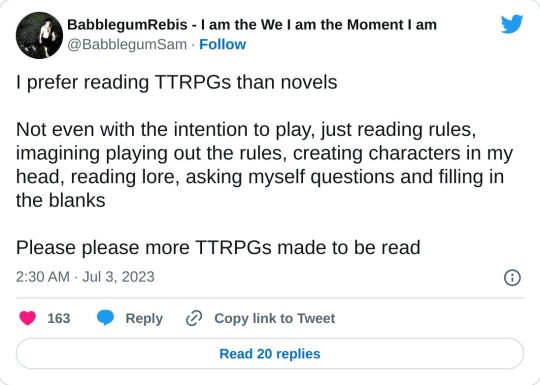
Been thinking about this & putting it into practice when writing The Perilous Pear & Plum Pies of Pudwick for a while: thanks to the ever excellent @babblegumsam (who you are probably already following and if not now is your chance to rectify that) for the final straw that made me write this up today. I truly believe if you have any interest in TTRPGs, play, or design you'll get something out of it, it's a further 5.4 mins read from here on out.
--------------------
Play is interaction.
Reading is interaction.
Below I will argue the necessity & usefulness of thinking the relationship between reading & play in TTRPGs as (almost) the exact same thing to unlock a wide & deep potential as reader/player/designer.
--------------------
Reading & play don't have to be the same thing. But you can't play without reading (in the sense of reading representations, images, ideas, concepts, interactions, etc, not just written text), because then there could be no interaction.
Reading and play can both accurately describe a given act or process. For instance: I read a table or piece of prose in a TTRPG book.
I say this because this is an idea that people struggle with, and while I encourage debate around the concept, we first have to agree on some basic building blocks that I hope I'm able to communicate here. For instance, there exists a potential reality in which tabletop roleplaying games are called tabletop reading games and nothing else about them changes (except for the consequential ability to think of reading in ttrpgs as play, and the potential this tool unlocks), because the prerequisite role for all other roles being played in a role-playing game is that of the reader.
This is true for much more than TTRPGs, but if we simply focus on acknowledging that reading & play in ttrpgs can and often are the same thing, then we are able to make informed design choices on this basis that we otherwise lack the agency to make – and which are nonetheless choices that are being made while we miss the opportunity to observe, read & ultimately interact and/or change and/or play with them.
To not think of the relationship between reading & play in TTRPGs in this way is to limit your agency as a designer, reader, player, and ultimately to cause yourself to be unable to synthesise these roles which are deeply inter-related, perhaps more so than they are disparate.
However you define it, Good Design necessitates the application of the right tool for the job. This requires making, maintaining & improving the tools that you have access to. The reader/player relationship is not only one of these, but an integral one that precedes a great many (if not all) of the other tools that you can & do employ as designer/player/reader.
If you allow this tool to remain blunt and imprecise (and especially if you don't acknowledge that it exists and that you use it in every choice you make), what you are doing is making a choice to blunt all of your other tools, even if you aren't aware of it.
This is poor design, poor play, and poor reading,* and I believe that this is true regardless of how you define each of those terms.
*though of course we could - and I think should - argue over the semantics & limitations of my imprecise use of the word "poor" there and the further ideas it smuggles in unacknowledged, but I trust that you will be able to infer what I'm trying to communicate in my use of it and I further hope that by leaving this imprecise application of a tool here in the way that I have used it, it might serve as a good example of the consequences, limitations & potential dangers of applying tools/terms/ideas that might be best described as "too blunt for the job", which is the very thing I'm attempting to highlight & address here.
It would not seem very sensible to choose to limit yourself in this way unless it allowed you access to new tools, which is a choice that you could only make once you are familiar with the central idea I'm presenting here – in other words, if you break the rules without understanding them you are very unlikely to be taking a step forward and much more likely to just be shuffling in place or even stepping backwards.
I hope that this short interaction has unlocked or reinforced your access to a useful tool that will allow you to sharpen your understanding of the play/reading relationship in TTRPGs and in turn refine & maintain your existing tools and your ability to synthesise new ones.
I look forward to discovering with you what new agencies this allows us to unlock, and I hope you take what you have read here and play with it to design new realities that you & I have yet to imagine.
#reading#play#ttrpg#indie ttrpg#ttrpg design#indie ttrpg design#tabletop roleplaying#games#game design#design theory#theory#design blog#ttrpg blog#ttrpg ideas#ttrpg resources#ttrpg mechanics#ttrpg dev#indie ttrpg dev#rpg design#ttrpgs for everyone#dialectics#communication design#communication theory#design philosophy#ttrpg community#ttrpg family#《 not a fan of that as a tool btw it is incredibly limiting and we could all do without it. why not be more precise & why not start now#any other useful tags you can think to add please do so. i think this deserves to reach far and wide & is very useful if i do say so myself!#Finally: take it and run with it. play/change/sharpen/blunt this tool. it's yours. make it your own (or dont). dont do what i say (or do) 🤡#respect & solidarity and thanks for reading. I hope you have found value in my contribution 🤝
263 notes
·
View notes
Text
the funniest thing about ttrpgs is that you can create a guy and say "his name is blorbo bleebus. he sucks severely. i hope that many misfortunes befall blorbo bleebus. he does not deserve to be happy." and at least one of your friends will immediately jump in to say "noooo... don't bully blorbo bleebus... i love blorbo bleebus..."
#my stuff#ttrpg#dnd#pf2#blorbo tag#edit:#i was not gonna use oc tags for every individual blorbo bleebus but i will because everyone tagging their own blorbo bleebus is so right#blanka my beloved#oc: kalef blakovel#oc: ksenia mitras#oc: cercil rebrum#oc: deltak libroh#oc: blumel narmor
18K notes
·
View notes
Text
hey so we put your boyfriend in a tabletop campaign and now he has a martyr complex. yeah he got protective to the point of being self sacrificial due to his lack of self worth. we gave him a found family so he had something to live for but instead he’s just committed to being a human shield to keep them safe even if it kills him. sorry
#starspeak#ttrpgs#my campaigns#sorry cas.#tumblr boyfriend#edit realized i said human shield. cas is an elf. whoops#i love seeing everyone tag their ocs btw. brings me so much joy#special s/o to everyone in the reforged campaign checking to see if z’ress has been tagged yet#and naomi literally one second after this was posted commenting about ganymede.#btw this is about my own character if that wasn’t. clear.)#get obnoxious (oc tag)
13K notes
·
View notes
Text
hey hey --
it's ya girl with another journalism request!!!
are you — or anyone you know — running a d&d campaign and have you noticed changes in your campaign dynamic after baldur’s gate 3 came out? do your players finally know how to use bonus actions and spell slots? i’d love to talk to you! please send me a DM here or email me at petrana at polygon dot com by friday (8/25)!!!
#bg3#baldur's gate 3#d&d#dungeons and dragons#ttrpg#journorequest#polygon#turning off reblogs since i have enough answers but ty for everyone who responded in DMs or the replies here or emailed me!!
1K notes
·
View notes
Text



⚔️ Hekate Valerius, bloodhunter of the Profane Soul
My human vampire hunter (she/they) in a modern DnD campaign!
#dnd#dnd art#artists on tumblr#digital art#oc#original character#bloodhunter#vampire hunter#vampire slayer#ttrpg art#character design#digital artist#“a girl wielding a sword is a strap allegory” etc etc#hekate is my babygirl and will kill everyone to save their lil vampire acquintances#hekate#my art#ttrpg
501 notes
·
View notes
Text
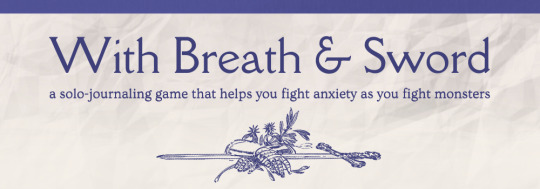
[ID: a banner for a game. it is light tan with a crumpled paper texture, and reads "with breath & sword" in large blue font, and "a solo-journaling game that helps you fight anxiety as you fight monster" below it in smaller font. there is lineart of gauntlets lying over a sword with some flowers at the bottom. end ID]
You find yourself tied to the monsters. The scratchy feeling in your chest. The way your hands tremble. The sweat that dots your upper lip when your senses are telling you a monster is close, again, now, and it’s your job to fight it. To stand up for your ideals and stand up to the threat. Whether you tame it, or this is truly a monster that needs to be slain, only time will tell.
You know you will succeed. You always have before. But that doesn’t mean it won’t be a challenge.
Grab your gear. Put on your boots. You know how to find it. You know what to do.
First, you just need to steady yourself.

[ID: a page spread from the game. it shows "step four" on one side, which goes over the five aspects of the game's oracle. on the other side it shows the first oracle component, where something you can taste determines what your heroic core is. the page is minimally designed, with a blue border and text on a white background, tan accents, and one image of a dragon. end ID]
With Breath & Sword is a solo-journaling TTRPG to help players combat anxiety.
In the game, you play as a monster-fighter, who is being summoned once again due to the presence of a new monster. Each time a monster appears, you struggle with the emotional effects of the magic: effects that look a lot like anxiety. You must steady yourself before you go off to fight: in the game and in real life.
Over the course of WB&S, players will participate in grounding methods and breathing techniques to calm themselves from an anxiety attack. These methods also serve as the game's oracle in order to determine how the story goes.
What You'll Need:
A safe space to play
A method of writing or recording
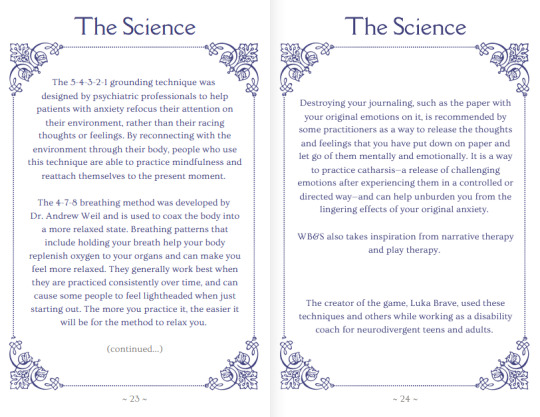
[ID: a page spread from the game. it is the section called "the science" and goes over the psychology behind the 5-4-3-2-1 grounding technique, the 4-7-8 breathing method, and destroying journaling. it has a few lines about narrative and play therapy, and that the creator of the game used these methods in his social work with neurodivergent teens and adults. end ID]
check out the game on itch now!!
#indie ttrpg#solo journaling rpg#solo ttrpg#journaling game#mental health#anxiety#THANK YOU TO EVERYONE AND ESPECIALLY ALL MY LOVELY KICKSTARTER BACKERS#the game is only 3 usd but there are plenty of community copies available too!!!#i wanted this one to be as accessible as possible so low price and free copies#spreading the word soooo appreciated!!! yall are the best!!!
151 notes
·
View notes
Text
did you know that the creator of the quote:
God blessed me by making me transsexual for the same reason God made wheat but not bread and fruit but not wine, so that humanity might share in the act of creation.
wrote a TTRPG based on Invisible Cities by italo calvino and the artwork is fucking gorgeous ???
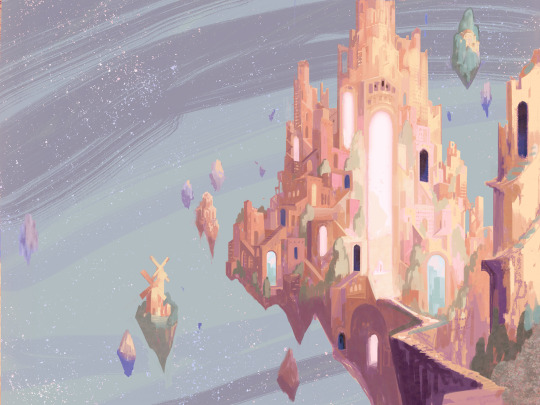
its called Inscrutable Cities and its a solo journaling RPG and its gonna be amazing
#inscrutable cities#possum creek#ttrpg#solo game#transgender#everyone on the moon is essential personnel
3K notes
·
View notes
Text
OUTLIERS is a solo TTRPG about a research assistant trying to run a study in a silly, surreal lab.
It's inspired by Welcome to Night Vale, Gravity Falls, and my own experiences as a researcher.
We're currently running a KS for a print run! We've already hit our goal, but we're announcing stretch goals very soon.
#huge thank you to everyone who's supported and helped spread the word!#outliers#ttrpg#solo ttrpg#indie ttrpgs#my ttrpg
180 notes
·
View notes
Text
So apparently the whole "should wheelchair users be allowed in D&D" argument is starting up again on a few social medias (mainly tik tok) and I'm just... I thought we were done with this?
Do I have a lot of thoughts on this? Yes. Am I going to talk about them today? No, because I was there during the shitshow that was "mainstream" players finding out about the combat wheelchair homebrew and I really don't want to go down that road again.
Because at the end of the day, if you're against it, why do care? Honest to goodness, if someone wants to play a character in a wheelchair in a game of make-beleive with their mates who are fine with it, what impact does it have on you? Especially if the player is in a chair themselves.
"But it's not realistic to have them in a medieval setting!!!" Ignoring for a moment that DnD (and other similar ttrpgs) are not strictly medieval settings because tech and magic, and that wheelchairs have existed since the 2nd century, in a game where a telepathic squid man can fly through space on a living ship, you can fuck devils and gods, shoot fire out of your face or hands, shape-shift into a dragon, be a robot and make a black-hole with two bags, you're choosing to draw the line at "person uses a chair with wheels and maybe some magic"
At the end of the day, it doesn't effect you. Let people play make-belive with math the way they and their friends want to.
#before anyone says it: i have a whole post already about why not everyone in this kind of setting would want to be “cured”#im not actually that worked up about this i just wanted to get my little rant in before it blows up again lol#actually disabled#disability#disabled#ttrpg#d and d#dnd#dungeons and dragons#let people enjoy things
155 notes
·
View notes
Text
Defining spaces, work-play separation, and avoiding TTRPG burnout.
I’ve seen a lot of folks in indie TTRPGs talk about overlapping issues and experiences around feeling burned out, not being able to keep up with new games, playing games starting to feel—or actually being—always for work rather than for fun.
I have begun to think of this issue as a game is never just a game. Not in the sense that it can’t be, but that many people working in TTRPGs in some capacity don’t allow it to be. Play has become the secondary function, because the game's primary function is no longer play, but something else. Be that a playtest, an Actual Play (AP) recording, a charity stream, content creation fodder (a review, a blog post, a video essay), a self-imposed obligation to stay on top of industry trends, etc. Because it is for work rather than play, the game is no longer play.
My firmly held litany against that is twofold:
1. Name the purpose of the game.
A playtest or AP can be fun, but you can't trick yourself into believing that that instance of play is for the sake of it. There’s a book I love called The Art of Gathering: How We Meet and Why It Matters by Priya Parker. One of the key takeaways is to be deeply intentional, for yourself and for the people joining you, in defining why you have gathered together. What does this do?
It frees you from the mismatched expectations that inevitably emerge when intentions are not set. The rules and expectations for a playtest are not the same as they are for play’s sake, so get everyone on the same page.
It allows you to fully take advantage of this instance of play for its primary function. Letting go of the notion that you’re “just” playing a game lets you set expectations different from those in a space where you’re playing for play’s sake.
Whenever I playtest, be that for one hour or an intended campaign, I am extremely candid with my playtesters about what I need from them. That the expectations of the space are different than when we play together for fun.
I ran a six-hour playtest of The Prince of Nothing Good a few weekends ago. If I was just running a game for fun, I would consider that a nightmare of a game length! I would never do that to my players!
But everyone had a blast with this playtest. Because we had set aside the entire day for that purpose, and said we’d play until it was done. Everyone came in with the goal of helping me iron out some kinks in the game, and was excited to do it. And that wouldn’t have been possible without defining why we were gathering at that moment, and what we were doing to make mode of gathering work for us (dedicated time, many short breaks, blanket permission to get up from the table to meet movement/food/bio needs, I bought everyone lunch).
2. Protect your time to play for the sake of play.
I believe the quickest way to kill your enjoyment of something is by making every instance of partaking in it work.
I’m aware there are Actual Play professionals who only play games as part of their jobs and not in their personal lives. That’s great for them, if they’ve figured out how to enjoy it (or earn enough money doing so that it doesn’t matter if they do), but the overwhelming majority of people in the game industry are simply not earning “only doing it for work” money. And until you are—and for most people in games, that will be never—you need to allow yourself time to just play games.
I’ve run a weekly home game since I got into TTRPGs, and I consider that space is sacred. Some of the players help me playtest outside of that game, but that weekly meeting is just for play, not work. Dedicating time for play to just be play makes it possible for it to be other things, too.
I’ve never experienced anything consider close to the TTRPG burnout, exhaustion, and frustration that I’ve heard many people talk about. I’ve done it to myself with other things! I used to read and evaluate theatre scripts for work. I’ve read literally hundreds of plays. And there was a whole chunk of time where I was still doing that and I absolutely dreaded reading plays. A friend invited me to a play reading group during the pandemic and I had to decline because reading plays was synonymous with evaluating them for what was honestly not enough money to do it.
So I just stopped. I don’t read scripts for pay anymore, and I stopped reading them for fun too, because I was at a place of deficit where even doing it “just” for fun was not appealing. I’m only now getting to a place where I am interested in reading theatrical work again. It is much harder to get back to a place of enjoyment than it is to never depart in the first place.
215 notes
·
View notes
Text
GUBAT BANWA LAYOUT PREVIEW: AREA PATTERNS!

A lot of Gubat Banwa's DNA owes itself to fellow tactical RPG juggernauts such as D&D4e, Lancer RPG, and Strike! RPG. The game's THUNDERING TACTICAL BATTLE System, combines high octane martial arts with precise positioning and volatile movement, creating a dramatic combat arena!
Above layout is by our seminal layout artist @lntpblk!
GUBAT BANWA is going to Kickstarter! Sign up now to get notified when it launches!
Please do get notified, we really want this project to succeed and get everyone really pretty print hardcovers of this!
#gubat banwa#ttrpg#gamedev#we're on 355 followers rn!#aaaaaaa#also everyone loves these chibi stuff so
240 notes
·
View notes
Text
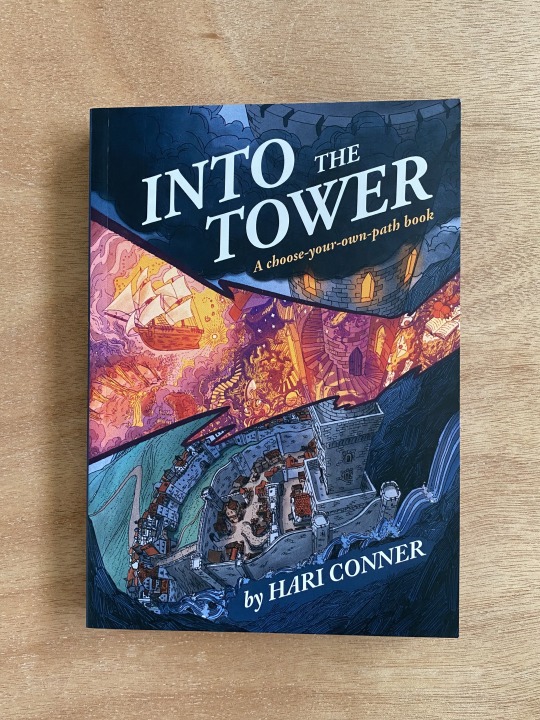

Things that can happen in this book:
you accidentally do some treason to impress a cool genderqueer spy you may be in love with
you come home to find your family house has been absolutely fucked up by some sort of magic and all your stuff got confiscated by very ominous ‘inquisitors’
you scam rich people into thinking you’re a servant with various gendered disguises. For stealing purposes
you get cursed by a mysterious book that REALLY wants you to find a forbidden Thing and destroy the world, which now seems like a great idea
These are just in the intros of the 4 characters you pick from at the beginning. Once you're inside there are a LOT of different choices, including eg. allowing you to be murdered by your clone, get trapped forever in the source of all magic or befriend a powerful woodlouse.
(Into the tower, out now)
#into the tower#trying to tell people about years-long projects on social media is hell and i massively appreciate everyone who's been reblogging stuff ty#solo RPG#ttrpg#choose your own adventure#queer books
158 notes
·
View notes
Text
I just wanted to show this funny man running in circles, but then
#I'm gonna play Cyberpunk Red soon (VERY EXCITED)#so I'm finally playing 2077 to get a feel for the world lingo etc#Despite its big 2.0 update it is Still Very Messy#but playable! Character writing and aesthetics are good#Installed a mod to reduce the gratuitous sex bullshit though#come on yall cyberpunk settings have more going for them than just ''everyone has sex always all the time''#anyway funny glitch haha :>#really wanna draw my character for the TTRPG campaign#her handle is Halloween :3
203 notes
·
View notes
Text

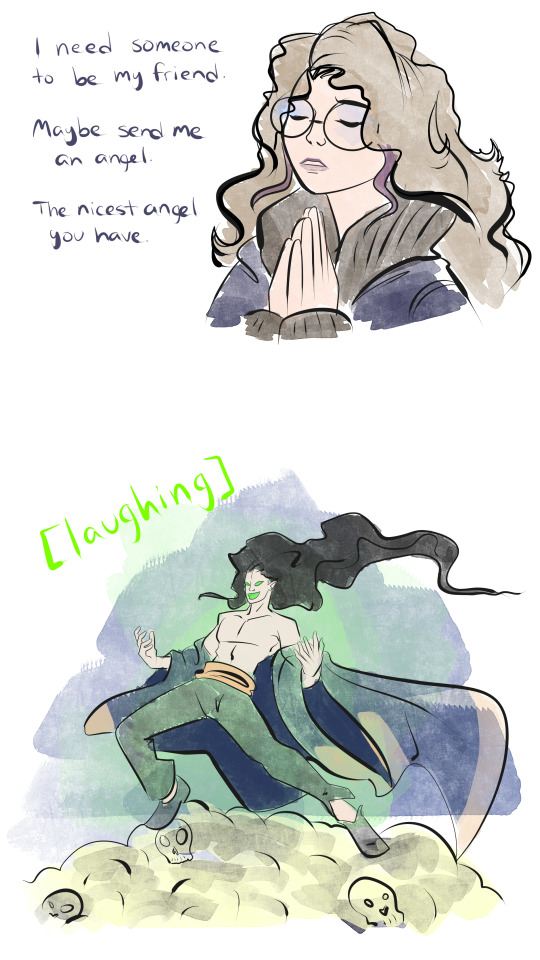

Finally finished reading Legionnaire but unfortunately it set me back on my bullshit and I'm trying desperately to spare my tabletop group from it.
I need to just sketch more, it helps me remember how to draw like an actual frigging adult.
#lancer rpg#lancerrpg#lancer ttrpg#nhp#horus#didymos#emma tansy#sam#look i fought so hard to be normal#i was ready to write off the lich as spooky paracausal tech and leave it at that#and the DM was like no#if you want a haunted mech it has to have an NHP#so i'm like#OKAY#and now this is everyone's problem#the reality is that the dynamic between emma and sam is the everyday dynamic that exists between me and the DM#and he's an infuriating fae creature (affectionate)#anyway i'm still waffling on sam's didymos design#i'll get there one day#hey raccoon why does he project all yassified?#because his pilot is 18 that's why
54 notes
·
View notes
Text
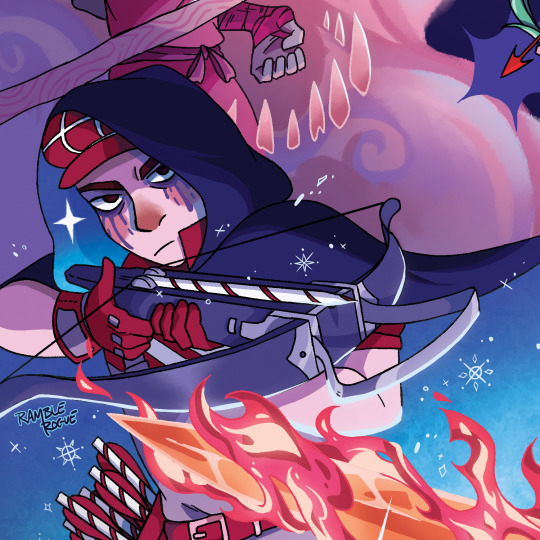
Little preview of my zine piece from @d20megazine!! I was SO pumped that I got to do a crown of candy piece, it's my fav season!! 🍬🍭🍰🍫
We are halfway through pre-orders!! Be sure to get your zine copy and check out all the awesome d20 art at d20megazine.bigcartel.com before they close!! ✨
We'll be donating all profits to the Transgender Law Center ! Boosts are really appreiciated so we can donate as much as we can!
#dimension 20#d20#a crown of candy#crown of candy#acoc#liam wilhelmina#dimension 20 acoc#d20 art#d20 zine#d20 fanart#acoc art#acoc fanart#dnd#dnd art#ttrpg art#dropout tv#ramblerogue#y'all are gonna lose ur MINDS when you see all the sick art in this zine#everyone is seriously so talented it's crazy
242 notes
·
View notes
Text
Voyager character dnd classes
see the other series here!
Janeway: paladin. literally no question she literally made an oath to get her crew home, she is a prototypical paladin. i started this series of posts because i realized how much of a paladin Janeway is.
Chakotay: paladin. i struggled a bit with Chakotay but he is obviously someone very dedicated to truth and justice and was willing to go off on his own path to fulfill that dream of justice when he joined the Maquis and that's very paladin of him.
Tuvok: monk. i think a lot of Vulcans have big monk energy due to their intense almost monastical studies and devotion to logic and Tuvok is a prime example who is highly trained in both physical and mental discipline and sought to help others (Kes, Suder) exercise that same discipline.
Torres: sorcerer. Torres very much lacks the formal training that a usual Starfleet engineer (or wizard) would have but (in my opinion) has even more natural talent for ambitious engineering and manages to be a miracle worker not through some pact or intelligence but just through sheer force of will.
Kim: wizard. look in the show, Torres and Kim were kind of presented as opposites (the Maquis vs Starfleet) with the personality differences to match despite having a vaguely similar set of skills and capabilities. so it really makes sense that if Torres is a sorcerer, Kim would be a wizard with all the traditional by the book learning that entails.
Paris: fighter. Tom Paris is a fighter and i don't have much of an argument other than ~vibes~ and the fact that only a fighter would think he could tank the damage from going warp 10 and then start turning into a salamander.
EMH: cleric/bard multiclass. look the EMH was literally designed to be a doctor. when he was first activated that was his entire purpose and nothing else so i don't think i can really argue that he isn't a cleric. but as he started to exist for longer, he consistently wanted to be something more (specifically a singer, see Virtuoso). i need to emphasize. he's not a good bard. he doesn't provide inspiration or support to anyone. but the fact is that he needs to prove he can be something more.
Neelix: bard. do i have to explain myself? Neelix is very much a jack of all trades master of none kind of character. he dabbles in pretty much everything and 90% of his scenes exist to give support and encouragement to other characters.
Seven: warlock. even in-universe, the Borg (when they're at they're best) are portrayed as this eerie eldritch entity so i think it would make sense that in dnd mechanics, even though Seven broke away from the Borg, she maintained that pact with them in order to keep performing sorts of magical acts (like her increased strength and like. bringing people back from the dead). but she also very much has that same darkness and melancholy that a warlock has from a pact with an ambiguously evil being.
Kes: druid. no question about this one. she has an affinity for plants and vague but powerful supernatural abilities drawn from the literal energy of the universe.
please feel free to reply with your own headcanons! i'd love to read them.
#voyager#star trek#kathryn janeway#chakotay#tuvok#b'elanna torres#harry kim#tom paris#emh#neelix#seven of nine#kes#star trek dnd fusion#i'm this close to starting to type up everyone's character backstories and pretending like i'm actually going to write something#but for real voyager would make a great ttrpg campaign (whether it's a dnd skin or not)#my posts
83 notes
·
View notes